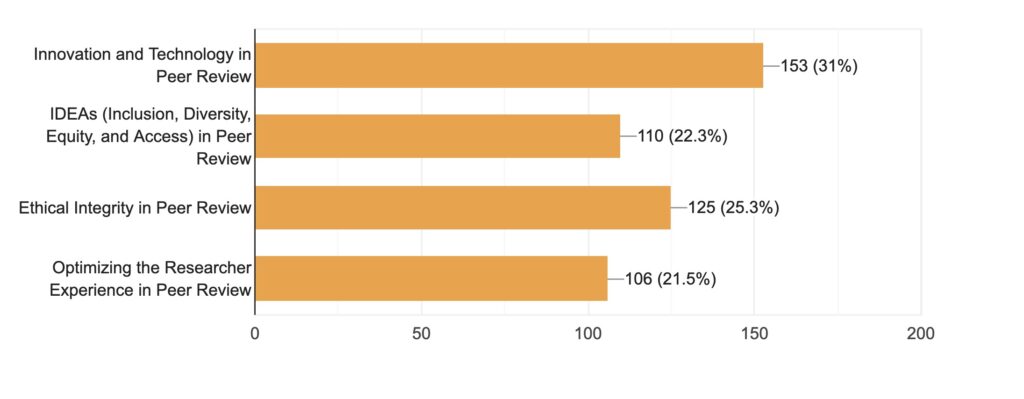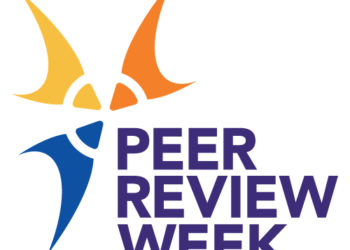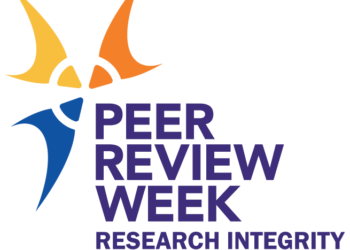Editor’s note: Today’s post is by the Co-Chairs of this year’s Peer Review Week Steering Group. Roohi Ghosh is the Ambassador for Researcher Outreach, Engagement, and Success at CACTUS. Maria Machado is a scientific reviewer, blogger, and independent publishing consultant at Stories4Sci. Gareth Dyke is the Academic Director at Reviewer Credits. Maryam Sayab is a Director of Communications at the Asian Council of Science Editors.
We’re delighted to reveal the eagerly awaited theme for this year’s Peer Review Week (Sept 23-27, 2024): “Innovation and Technology in Peer Review.” Peer Review Week is a globally recognized, annual, community-led, virtual event that celebrates the indispensable role of peer review in upholding research quality. It has developed into a pivotal platform for researchers, publishers, editors, and other stakeholders to converge, exchange insights, and spotlight the latest advancements in scholarly communication.
Peer Review Week 2024 marks a significant milestone in our collective journey to elevate peer review practices and foster collaboration across the scholarly community. Focusing on “Innovation and Technology in Peer Review,” we aim to underscore the critical intersection of cutting-edge technologies and peer review processes. This theme reflects our commitment to address the evolving needs of the academic landscape, embrace innovation, and foster best practices.
While highlighting the “Innovation and Technology in Peer Review,” it’s clear that artificial intelligence (AI) is shaping the future of scholarly communication. AI-powered tools and algorithms present exciting opportunities to boost efficiency, transparency, and rigor of peer review processes. From compiling metadata for/from aggregators, indexing purposes, and predicting demand for stock, to automating manuscript screening and aiding in decision-making, these advancements are expected to streamline workflows, mitigate bias, and hasten the spread of scholarly insights.
Yet, amidst the excitement surrounding AI-driven innovation, it’s crucial to pause and consider the implications. Worries about algorithmic bias, data privacy, and the potential displacement of human expertise underline the importance of integrating AI into peer review workflows thoughtfully and responsibly. While AI can undoubtedly aid in keyword extraction, abstract composition, and the production of plain language summaries, it is debatable whether it will enhance human capabilities and elevate the quality of peer review. AI may enable researchers and reviewers to focus on substance rather than formatting, particularly those for whom English isn’t a first language, but maintaining transparency, accountability, and ethical standards remains paramount to safeguarding the integrity and fairness of the process.
Research integrity and DEIA (diversity, equity, inclusion, and accessibility) are also crucial considerations when discussing innovations in peer review. Addressing many of the world’s challenges, such as those outlined in the UN Sustainable Development Goals, requires a multidisciplinary approach. AI can assist in diversifying and broadening the reviewer pool by identifying and recommending qualified reviewers from various fields and backgrounds. While AI has prompted concerns regarding integrity, it also holds potential as a tool for detecting and flagging ethical issues and inconsistencies in research.
We are witnessing changes in the approach to peer review, driven by technological advancements and a growing emphasis on inclusivity and integrity. At this year’s celebrations, we aim to initiate a dialogue on these evolving practices and explore the future of peer review.
This year’s theme “Innovation and Technology in Peer Review” was chosen through a global poll to represent the collective voice of the academic community. After careful consideration and collaboration, the 2024 Steering Group, co-chaired by Roohi Ghosh, Gareth Dyke, Maryam Sayab, and Maria Machado, has selected this dynamic theme to explore the evolving landscape of peer review in the digital age.
Choosing the theme was no small feat. The steering committee initially proposed 26 compelling themes, reflecting the diverse perspectives and priorities within the peer review community. From these, four emerged as the most promising, based on the votes of the committee members themselves. Finally, these four themes were presented to the public, allowing for input from stakeholders across the globe. “Innovation and Technology in Peer Review” emerged as the clear choice, embracing technology to broaden the reach of peer review and ease the adoption of innovative practices as shown in Figure 1

As we kick off Peer Review Week 2024, we warmly invite the global peer review community to join us in exploring the convergence of innovation, technology, and peer review. Through a series of dynamic events, and thought-provoking discussions, we aim to applaud past achievements, confront current challenges, and chart a path toward a more inclusive, transparent, and efficient peer review landscape.
Stay tuned for updates on Peer Review Week 2024 as we come together to discuss innovation and technology in peer review.
Discussion
1 Thought on "Peer Review Week 2024: “Innovation and Technology in Peer Review”"
Thank you for your perspective.
I would like to just bring in our two cents here and let the community know about an interesting collaboration in automated peer review.
SciScore, a text mining tool is dedicated to helping authors, peer reviewers, and editors understand their documents with regard to rigor checks such as the NIH criteria, STAR methods, and MDAR ( implemented by Science Magazine).
Our recent data has shown that multiple indicators of rigor improve with consistent tool use at a publisher. Early but significant results also show that the scores are associated with the reject/accept decision.
Over the last year we have been working with members of the rigor and transparency community including other toolmakers and the UK’s NC3Rs to add support for the ARRIVE guidelines, see press release
https://arriveguidelines.org/news/arrive-compliance-checker


